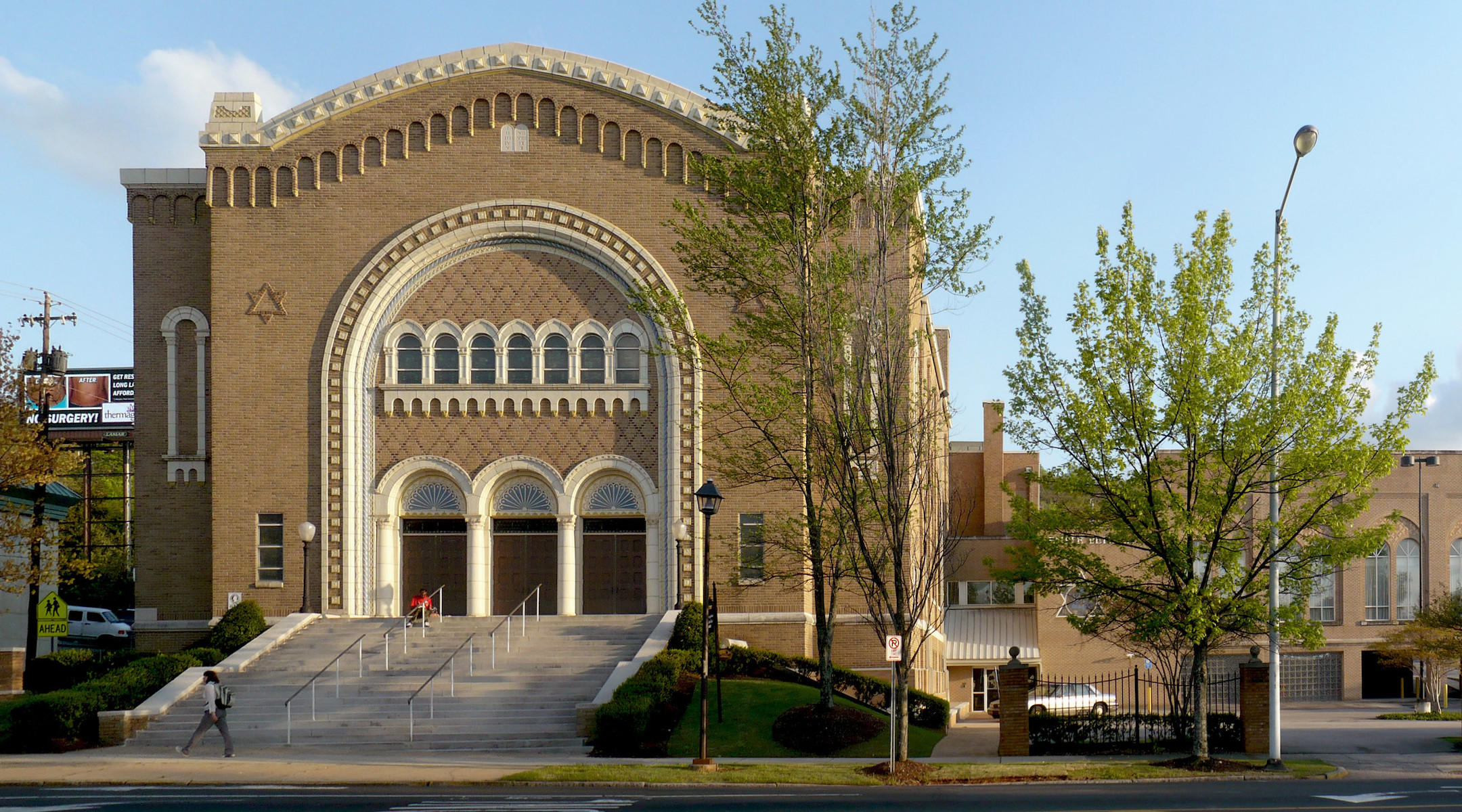Birmingham, Alabama, synagogue fire wasn’t an antisemitic attack, rabbi says

Temple Beth-El of Birmingham, Alabama, as seen in 2010. (Photograph by user Dystopos on Flickr)
(JTA) — A man was taken into custody after authorities in Birmingham, Alabama, investigated a suspicious fire adjacent to a synagogue there on Friday.
The fire, which came as Jews across the United States are on high alert, was determined not to be motivated by hatred against Jews, Rabbi Steven Henkin of Temple Beth-El told congregants over Shabbat. The man had also set other fires in the city, Henkin said authorities had determined.
“There is no evidence of an antisemitic attack,” Henkin said during Friday night services, which were streamed on Facebook. “He has admitted to lighting it and said it had nothing to do with us being a synagogue.”
But the rabbi, who addressed the incident again against during Saturday morning services, said the motive for the incident was almost immaterial at a time of rising antisemitism in the United States.
“It doesn’t really matter whether it was antisemitic or if it wasn’t. When we didn’t know, it certainly felt like it could have been,” Henkin said. “As a community, we should all be grateful that it wasn’t and it still makes us a little fearful and scared and anxious that with everything going on in the world as it is, we are aware that it just as easily could have been.”
The fire took place while synagogues in New Jersey were under an FBI warning about a “broad threat” to them; a man there was taken into custody on Friday and the threat was lifted. Meanwhile, antisemitic comments by rapper Kanye West have focused attention on Jews and the hatred they face White supremacist hate groups, including the Goyim Defense League, have adopted West’s comments as a rallying cry, ratcheting up their activity across the United States. Meanwhile, a change of leadership at Twitter has spurred antisemites to target Jews and other minorities online, and NBA star Kyrie Irving has faced consequences after endorsing an antisemitic movie.
The Birmingham incident quickly drew national attention, including from antisemitism watchdogs. But authorities there determined that it was unrelated, Henkin said.
Beth-El community members observed evidence of a fire in a breezeway on the Conservative synagogue’s campus and alerted authorities early Friday morning, according to Henkin’s account and local news reports. Police found that a propane tank wrapped in clothing had been set ablaze inside a locked area of the campus; they also used a robotic device to assess a backpack found at the synagogue, which was determined not to contain explosives, and the community was cleared to return to the building during Shabbat.
Temple Beth-El is one of four synagogues in Birmingham, a 150-year-old community with about 6,300 Jews, according to a 2016 study by the Birmingham Jewish Federation.
Henkin and others present at Friday night services said the synagogue’s safety plan, created in conjunction with the Jewish nonprofit Secure Community Network, had been effective.
“The security system worked, which was good, and the communal response was fantastic,” Henkin said, noting that Jewish and non-Jewish leaders in Birmingham had reached out to offer support, as had representatives of national Jewish organizations. He added, “It was a scary time and we were not alone.”
Henkin referenced the New Jersey threat, West and Irving during his speech on Saturday morning, when he again offered details about the incident at Beth-El and told his congregants that it was valid for them to feel attacked even if authorities had determined they were not targeted because they are Jewish. Still, he said, the right response was not to give in to fear of antisemitism.
“There are lots of ways we can react to yesterday,” Henkin said. “We could become scared, frightened and fearful and let it affects us. We can pull ourselves back, withdraw, put up barriers and walls as a way to protect ourselves. We can be angry, hurt and pained and allow that to make us lash out at anyone and anything. We can refuse to hear anything or anyone but what we want to hear and hate everyone else for what suffering they caused us,” he said. “Or we can overcome those feelings and be present here today, recognizing we are not alone.”
Temple Beth-El was one of at least four synagogues in the South targeted in a wave of bombings in the late 1950s; the bombings were widely understood to reflect white resentment against Jewish participation in the movement for Black civil rights. None of the Birmingham culprits were caught in part because the FBI declined an invitation to investigate, a U.S. Senate hearing in 1959 revealed. The synagogue erected a plaque commemorating the bombing, which was thwarted, in July.
This article originally appeared on JTA.org.

I hope you appreciated this article. Before you go, I’d like to ask you to please support the Forward’s award-winning journalism this Passover.
In this age of misinformation, our work is needed like never before. We report on the news that matters most to American Jews, driven by truth, not ideology.
At a time when newsrooms are closing or cutting back, the Forward has removed its paywall. That means for the first time in our 126-year history, Forward journalism is free to everyone, everywhere. With an ongoing war, rising antisemitism, and a flood of disinformation that may affect the upcoming election, we believe that free and open access to Jewish journalism is imperative.
Readers like you make it all possible. Right now, we’re in the middle of our Passover Pledge Drive and we still need 300 people to step up and make a gift to sustain our trustworthy, independent journalism.
Make a gift of any size and become a Forward member today. You’ll support our mission to tell the American Jewish story fully and fairly.
— Rachel Fishman Feddersen, Publisher and CEO
Join our mission to tell the Jewish story fully and fairly.
Only 300 more gifts needed by April 30























